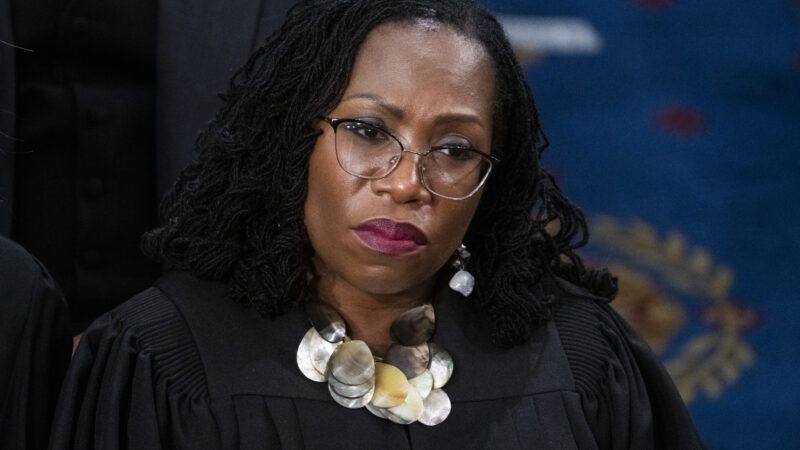Ketanji Brown Jackson Joins Conservative Justices in Upending Hundreds of January 6 Cases
Her concurrence is a reminder that the application of criminal law should not be infected by personal animus toward any given defendant.

The Supreme Court on Friday narrowed the interpretation of a federal criminal law under which many January 6 rioters have been charged, throwing hundreds of such cases into at least partial uncertainty. It was yet another 6–3 decision.
But despite the immensely politically-charged nature of the case, it was also yet another time that the votes did not come down along exclusively ideological lines. The majority opinion was written by Chief Justice John Roberts and joined by Justices Clarence Thomas, Samuel Alito, Neil Gorsuch, Brett Kavanaugh, and Ketanji Brown Jackson, the latter of whom wrote a concurring opinion urging the government to keep criminal laws constrained to their actual text. (Justice Amy Coney Barrett wrote the dissent, joined by Justices Sonia Sotomayor and Elena Kagan.)
As Reason's Jacob Sullum outlines, the Supreme Court's decision centered around Joseph Fischer, a former Pennsylvania police officer who was charged with several offenses related to his conduct at the Capitol riot. According to the government, that lawlessness included, among other things, that he "forcibly assaulted a federal officer, entered and remained in a restricted building, and engaged in disorderly and disruptive conduct in the Capitol."
But prosecutors tacked on another charge using the Sarbanes-Oxley Act of 2002, which criminalizes "alter[ing], destroy[ing], mutilat[ing], or conceal[ing] a record, document, or other object, or attempt[ing] to do so, with the intent to impair the object's integrity or availability for use in an official proceeding," or, per the following provision, "otherwise obstruct[ing], influenc[ing], or imped[ing] any official proceeding." Those convicted face up to 20 years in prison.
Fischer challenged that charge, arguing that the statute as written requires the alleged obstruction in question be tied to the impairment of records, documents, or objects, which would not apply to him. The federal judge who initially evaluated Fischer's petition sided with him; a divided U.S. Court of Appeals for the D.C. Circuit reversed that; and the Supreme Court reversed the reversal.
That Justice Jackson sided with Fischer shouldn't, in theory, come as a surprise. She is the only former public defender on the current Court; in the judiciary broadly, you are far more likely to find former prosecutors on the bench. So it stands to reason that she understands first-hand the downsides of government getting creative with criminal statutes, as prosecutors sometimes do.
Nevertheless, it probably is surprising to many onlookers, for at least a couple of reasons. First, the common narrative, it seems, is that this Supreme Court is more radical, extreme, and polarized than ever before. As I wrote earlier this week, that's not at all reflected in the data: The early part of this term was defined by a historic number of unanimous decisions, and today's 6–3 decision being composed of a heterogeneous group is actually quite common. It just rarely drives the news.
And then, on top of that, of course, there's the fact that Joseph Fischer is a criminal defendant in one of the most politically-loaded cases of this century. But Jackson's concurrence is a reminder that the application of criminal law should not be infected by personal animus toward any given defendant.
"Our commitment to equal justice and the rule of law requires the courts to faithfully apply criminal laws as written, even in periods of national crisis," she writes. "We recognize this intuitive fact—that there is a certain category of conduct the rule is designed to prohibit—because we recognize, albeit implicitly, that the drafters of this rule have included these particular examples for a reason. We understand that, given the preceding list of examples, this rule was adopted with a clear intent concerning its scope."
To buttress her case, Jackson looks to the history of the statute, which was enacted in response to the revelation that Arthur Andersen LLP, auditor for the disgraced energy corporation Enron, had torched potentially incriminating documents. "There is no indication whatsoever that Congress intended to create a sweeping, all-purpose obstruction statute," Jackson concludes.
In response, Attorney General Merrick Garland said in a statement that he is "disappointed by today's decision, which limits an important federal statute that the Department has sought to use to ensure that those most responsible for that attack face appropriate consequences." Fortunately for him, he is still free to prosecute people for violating the laws that Congress enacted, which isn't an unfair limitation.


Show Comments (69)